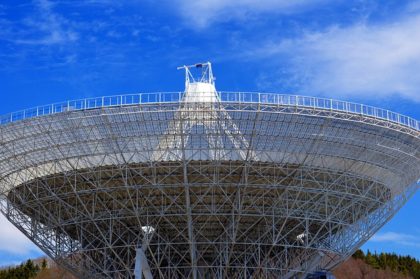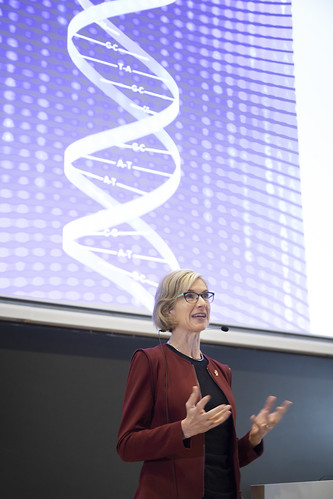
 )
)We’ve reached the midpoint of the Most Pressing Science & Faith Question tournament, possibly the only tournament with more “upsets” than the actual basketball one. The top vote-getters in this round will make the final four and get expanded discussion. So cast your votes to make sure your curiosities are not relegated to a handful of sentences next week. Click here for a larger scale bracket if the embedded poll below is not convenient. Voting is open until midnight EDT on Sunday (March 28). Once again we had some very close decisions, so you could cast the crucial vote. I’m especially curious to see how the AI vs ET showdown turns out.
Once again, keep scrolling after the poll to see my quick takes on the eight questions that did not advance.
Philosophy & Ethics
- Is science the only or best way to know truth?: I’d say ‘no.’ The shortest route is to observe that if it were true that science was the only way to know truth, there would be no scientific way to know that, yielding a contradiction. More constructively, I think there is value in differentiating between science and disciplines like history which also rely on evidence but apply different methodology and criteria. There are also disciplines like mathematics and philosophy that rely more heavily on deductive reasoning and less on evidence compared to science. I know some folks try to define science broadly enough to encompass all these disciplines and more in order to claim science is the source of all truth or something like it, but I think at that point you’ve basically just constructed a tautology at the expense of having a specific and operational understanding of science. I would also say that there are truths about subjective experiences that are not as amenable to scientific inquiry, except perhaps indirectly through interviews and questionnaires.
- How should we interact with biomedical products of exploitation?: Probably the most widely known examples are vaccines which are tested or manufactured using cell lines derived from aborted fetal tissue. However, I would also include here anything derived from work with HeLa cells which are derived from a tumor without the specific consent to be used so widely. For me, the tension is between trying to redeem some good (i.e. saved lives from a vaccine) from bad choices or unfortunate circumstances, and eliminating incentives for future exploitation of additional individuals. As I see it, there is no marginal harm to Henrietta Lacks or the anonymous individuals who were the sources of various cell lines from each additional use of those cells. At the same time, we do not want to implicitly tell future researchers that the ends of biomedical research justify the means of neglecting consent. I think the best way forward is to move with all speed to using other cell lines, acknowledging that cannot be done all at once because of the need to have validated protocols and procedures.
Theology & Religion

- Is God a tenable scientific hypothesis?: My take is ‘no’ because I cannot see what would serve as our null hypothesis or negative control. What would the outcome look like without God? Well, if God is as described in the Bible, there is no part of physical reality that God did not create and does not sustain. It may therefore be that only the complete absence of anything is what it would look like without God, but that’s not a terribly useful null model. I suppose a counterpoint could be that God’s sustaining providence looks like the regularities of physical reality but that God also sometimes intervenes miraculously counter to those regularities. I suppose it is possible those instances could be explored scientifically, but the specific examples we see in the Bible such as the incarnation and resurrection of Jesus are singular events by nature and thus not readily subjected to the scientific method. That said, certain one-time events like the Chicxulub impact at the end of the Cretaceous can be studied with the scientific method because their consequences are extensive and multifaceted. In those instances, the repeatability that is typical of scientific investigation comes in the form of repeated sampling and/or independent lines of evidence (more on that when we get to the consensus & consilience question). Perhaps someone more clever than me could think of a way to test a miraculous intervention in this way.
- How is science discussed in the Bible?: Take 1–it isn’t, because what we call science didn’t emerge until over 1,000 years later. Take 2–verses like Psalm 111:2 commend appreciation for God’s creation and have encouraged scientists through the centuries. Take 3–Verses like Psalm 19:1 and Romans 1:20 inform the concept of general revelation, and some take them even further to indicate we can prove the existence of God using science. My hesitation with that particular reading, or rather the applications of that reading I’ve seen which rely heavily on contemporary physics and/or molecular biology, is the implication that the full realization of those verses only occurred very recently and for a relative few with technical knowledge. It makes more sense to me that these verses refer to common experience of creation and imply that we can learn what God is like from his creation, rather than whether he exists. Take 4–Language and concepts learned from common experience of creation are present throughout scripture, not to teach us facts about the physical world but to build on that experience to teach us something about God. This is consistent with the idea that Psalm 19:1 and Romans 1:20 are talking about learning what God is like.
Origins
- Do evolutionary origins render design in biology merely apparent?: Theologically, I think if we are going to say that God created all of physical reality including all life and that God did so with intent, then I think we are talking about design. I’m fine with that conclusion and saying that all life is designed by God; I don’t know what it would mean to say I believe God created life without design. So from that perspective I don’t think we need to say that whatever design we see in life is just appearances. Further, I think evolution is a valid design method. So even if I did not believe God created life, I would say it is valid to describe life as designed. Evolutionary biology is, among other things, how we describe the means by which that design was accomplished and implemented.
- Is belief in God necessary for the invention of science?: Observationally, the Western science tradition arose in cultures strongly shaped by Christianity and Islam. Further, many of the contributors to the development of science as a methodology and the body of knowledge about the physical world were themselves believers from one of those faith traditions. Belief in a creator God who made the world comprehensible and gave people the faculties to comprehend it motivated their desire to understand the world better and their expectation that outcome was possible. All of this raises the question of whether theism or even more specifically monotheism is required to develop science. My sense is the question is of particular interest as a counterpoint to the idea that science leads to or is most compatible with atheism; another way of phrasing the question is whether a predominantly atheist or secular society could invent science. I think there’s an interesting hypothetical exploration to be had there. To what extent does some kind of belief in the supernatural necessarily emerge as an explanation for unanswered questions about the physical world (why does the weather change? where did it all come from? etc.)? Is it possible to develop mechanistic answers to those questions fast enough to avoid hypothesizing about supernatural beings? Can people be satisfied for generations and generations without any answers to those questions? And so on. At the same time, we don’t need counterfactuals to go beyond the western tradition and observe that other cultures developed rigorous models of the physical world without at least monotheism. For example, Indian astronomers worked out a heliocentric model of the solar system centuries before Europeans, with mathematical precision that was as good or better.
The Future

 )
)- Where will genetic engineering take us, and should we go there?: We are already seeing the first glimpses of the promise that CRISPR holds for treating hereditary diseases like sickle cell anemia. For specific conditions, I expect we will continue to see encouraging results, bringing the possibility of cures to patients who otherwise faced the need for lifelong management. I think this is especially notable for those with very rare genetic conditions. Traditional therapeutic research would require screening many drugs in the hope of finding an effective one; this is a time-consuming and therefore expensive process that can be challenging to fund when so few are impacted. CRISPR offers the possibility that as long as we know the relevant genetic sequence, we can bypass that process and implement a targeted therapy. Various cancers may also be amenable to CRISPR-based therapy. At the same time, the search for genetic causes of various conditions has revealed that only some can be linked to one or a few changes in a single gene. Many human traits are influenced by a large number of genes, making it challenging to predict what the effects of any edits would be. This polygenic nature of many traits will likely limit the scope of genetic engineering applications for the foreseeable future; radical sci-fi manipulation appearance, body plan, or mental faculties will likely remain fictional. Making edits when we can’t anticipate the full ramifications would be unethical.
- How do we keep our technology from repeating and amplifying our biases and mistakes?: In some cases, it can be as simple as expanding the training data. For example, some facial recognition software does not perform equally well for people of all skin tones and facial features. One identified explanation is that the algorithms learned how to recognize faces from pictures that were predominantly from races more than others. A more representative selection of training images would help with this issue. In other cases, the causes go deeper. For example, algorithms have been developed from criminal court records to provide information like sentencing recommendations. Some of these algorithms have been found to have a racial bias. It is also known that racial biases exist in actual past sentences; in other words, the most representative training data will itself be biased. Solutions in that case may require limiting the use of such algorithms to circumstances where they are least biased, adding human decision-making that is aware of the relevant racial issues, or explicitly factoring race into the algorithm to make adjustments for known past injustices.
Andy has worn many hats in his life. He knows this is a dreadfully clichéd notion, but since it is also literally true he uses it anyway. Among his current metaphorical hats: husband of one wife, father of two teenagers, reader of science fiction and science fact, enthusiast of contemporary symphonic music, and chief science officer. Previous metaphorical hats include: comp bio postdoc, molecular biology grad student, InterVarsity chapter president (that one came with a literal hat), music store clerk, house painter, and mosquito trapper. Among his more unique literal hats: British bobby, captain’s hats (of varying levels of authenticity) of several specific vessels, a deerstalker from 221B Baker St, and a railroad engineer’s cap. His monthly Science in Review is drawn from his weekly Science Corner posts — Wednesdays, 8am (Eastern) on the Emerging Scholars Network Blog. His book Faith across the Multiverse is available from Hendrickson.

Leave a Reply